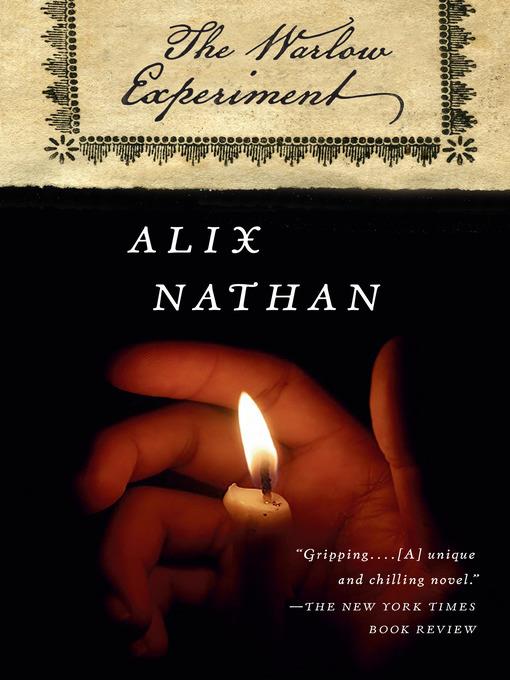
The Warlow Experiment
A Novel
کتاب های مرتبط
- اطلاعات
- نقد و بررسی
- دیدگاه کاربران
نقد و بررسی

June 3, 2019
Nathan’s intriguing yet overlong U.S. debut tracks what happens after an experiment in late-18th-cenutry Wales goes awry. In 1793, the wealthy Herbert Powyss, seeking to “contribute something important to the sphere he so admired: natural philosophy, science,” devises an experiment—to have a man live in total isolation for seven years in chambers deep under Powyss’s Welsh estate. The incentive is £50 per year for life, and only one man applies: the semiliterate, working-class John Warlow. Warlow is given ample comforts—the same food that Powyss eats (delivered via dumbwaiter) and any book he desires. But Warlow has little interest in reading and can barely write in the journal he’s supposed to keep; he’s more interested in the frogs he finds in his chambers. Complications further ensue when Powyss develops an affection for Hannah, Warlow’s wife. Naturally, the experiment doesn’t go as planned, but the novel never picks up a full head of steam, instead remaining largely static narratively and devoting ample page space to the servants on the estate. There are provocative wrinkles—such as whether it’s an inevitability that Powyss was going to hate the man he is experimenting on—but the story takes too long to get where it’s going and doesn’t fully land once it does. Nathan’s novel never fully lives up to its promising premise.

June 15, 2019
An 18th-century Englishman tries to isolate a man in his manor's basement for years in the name of science. What could go wrong? Nathan's second novel (The Flight of Sarah Battle, 2016, etc.) is inspired by the true story of a man who offered 50 pounds a year for life to a man willing to live underground for seven years. But it's strongly informed by what we now know about solitary confinement, which is to say it's a doomed endeavor. Herbert, a bachelor landowner in the West Midlands, put out a call in 1793 for a man willing to live alone in a well-appointed but windowless basement room, where he'd have a comfortable bed and regular meals (served via dumbwaiter). He has one taker: John Warlow, a laborer struggling to support his wife and four children. He's barely literate, so the presence of Robinson Crusoe in the library is mockingly absurd, and the journal Herbert requires be filled for research purposes is barely scrawled in. Unsurprisingly, in time John grows confused and feral. What's happening downstairs clarifies the power lines and capacity for cruelty and chaos upstairs. The servants and gardeners on the estate see John's confinement as further proof of the need for the class revolution sweeping the country, while Herbert stubbornly digs in, determined to use John to justify his introversion. (Though Herbert's contact with John's wife, Hannah, complicates that attitude in multiple ways.) As an allegory of prison culture at its cruelest, Nathan's novel forces its conclusion, and one friend exists mainly to send Herbert finger-wagging letters, but overall the novel is a powerful rebuke to the notion that withholding compassion can somehow be corrective. Nathan's main strength is her keen characterizations of all involved, fully inhabiting Herbert's selfishness and John's confusion and slow, crushing descent. A sturdy historical novel about the perils of pseudoscience, revealing how selfishly oblivious we can be to facts and emotion alike.
COPYRIGHT(2019) Kirkus Reviews, ALL RIGHTS RESERVED.

August 1, 2019
Herbert Powyss is a Welsh gentleman of means living at the close of the 18th century. His fortune allows him to pursue studies in botany, and he has made minor contributions in this field. However, he longs to leave his mark on history by conducting an experiment in human behavior whose results can be presented to the Royal Society of London. He wants to isolate a human subject from all human contact for seven years, promising a lifelong stipend at the end of the experiment. John Warlow, uneducated and almost unlettered, applies for the job. While the project proceeds for more than three years, the results are less than satisfactory. Meanwhile, the outside world also provides challenges for Powyss. Circumstances cause the experiment to be terminated abruptly, which leads to tragedy for everyone involved. VERDICT Nathan (The Flight of Sarah Battle), who bases this story on a real event reported in 1797, supplies the details to make her characters come alive, capturing the difficulties in human relationships (or lack thereof) and the tragic outcomes that can arise from unforeseen circumstances. All general readers will enjoy.--Joanna Burkhardt, Univ. of Rhode Island Libs., Providence
Copyright 2019 Library Journal, LLC Used with permission.

August 1, 2019
People can agree to strange things in the name of science. In John Warlow's case, he agrees to be isolated in relative comfort for seven years at the estate of Herbert Powyss. In return, he would receive an annual stipend of 50 British pounds per year for the rest of his life, providing well above his laborer's wages for his wife and six children. Powyss, a reclusive amateur botanist who dreams of larger contributions to the burgeoning world of science at the close of the eighteenth century, wants to explore how a human could survive in complete solitude. But despite his best efforts to make the experiment a success, which include the provision of a chamber organ in Warlow's rooms and listening tubes to give Powyss insight into what is happening, it is only a matter of time before the experiment goes terribly awry, with tragic consequences for everyone involved. Inventive and engrossing, this novel casts a glaring light on the so-called Age of Enlightenment and the realities that come crashing down on Powyss' high-minded pursuit of knowledge.(Reprinted with permission of Booklist, copyright 2019, American Library Association.)

























دیدگاه کاربران